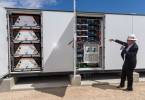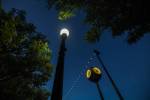Utility denied right to buy ‘green energy’ credits
Is the state law that requires investor-owned electric utilities to obtain a portion of their power from solar, wind other renewable sources worth the paper it's printed on? Observers could wonder.
The Nevada Legislature first adopted a renewable portfolio standard in 1997, but have revised the law twice since.
Nevada Power Co. of Las Vegas has never obtained the required amount of renewable power over the last 10 years. However, Nevada Power was able to satisfy the Public Utilities Commission for the last two years by buying renewable credits from its affiliated utility, Sierra Pacific Power Co. of Reno, which benefits from an abundance of geothermal power from hot underground water and steam.
In a decision Wednesday, the utilities commission refused to allow Nevada Power to buy renewable credits from Sierra Pacific Power, noting that the Northern Nevada utility could run out of renewable energy credits in a few years. As a result, Nevada Power did not satisfy the requirement that 6 percent of its power came from renewable sources, such as wind, solar and geothermal plants.
Both Nevada Power and Sierra Pacific Power have failed to meet the minimum that requires 5 percent of renewable energy come from the sun.
The utilities commission, which has passed on opportunities to fine the utilities for noncompliance in the past, again decided not to penalize the utilities for violating the state law on renewable power use.
The commission was ratifying an agreement reached by the attorney general's Bureau of Consumer Protection, commission staff and two renewable energy developers, who did not want the utilities fined.
Critics disagree with the decision.
"I think they should start to impose sanctions. If this were a first offense, it would be one thing," said state Sen. Dina Titus, D-Las Vegas. "But they have had plenty of time, and it's just a pattern."
Titus said the situation is a common one resulting from Nevada's part-time Legislature.
"You can pass all the good laws you want, but leave town for 18 months and the executive regulatory agencies ignore (the laws)."
Charles Benjamin, director of the Nevada office of Western Resource Advocates, called for more teeth in the law. By failing to fine the utilities, the utilities commission "is sending a signal to the company" that there is no penalty for violating the law, he said.
Benjamin suggested the Legislature revisit the renewable law and consider mandatory fines when the utilities do not obtain the required minimum quantity of power from renewable sources.
Tom Fair, executive of the utilities renewable energy program, said the utilities could require the renewable developers to pay fines and said that would "be counterproductive" to renewable energy development. "At the end of the day," Fair said, "nobody would benefit from that."
Lydia Ball, regional representative of the Sierra Club, also favored fines. She noted that the electric utilities have regained financial strength. Earlier this month, for example, Moody's Investors Service boosted bond ratings for the utilities to investment grade, up from junk bond levels.
"We do think that the fines should be imposed now" when the utilities don't meet state requirements for renewable energy," Ball said. "Nevada Power and Sierra Pacific are now financially stable enough to invest in renewable projects on their own."
Holding company CEO Michael Yackira said the utilities do intend to build renewable-power plants of their own, rather than only entering contracts with independent power producers who build renewable-power plants.
Yackira also recalled that the two utilities have been waiting for Acciona Energy and a predecessor company to build the 64-megawatt Nevada Solar One power plant to comply with the solar provision of the law. Acciona completed the solar thermal power plant at Boulder City in June after several delays.
Yackira hopes the Boulder City project plus a solar project at Nellis Air Force Base will generate enough solar power to meet the solar requirements for Nevada Power and Sierra Pacific Power in 2007. By year's end, Nevada should be getting more solar power and more geothermal power per resident than any state in the country, the CEO said.
Others are not impressed.
"They have been undercompliant (for renewable power) ever since the beginning in Nevada," said Jeff Deyette, an energy analyst with the Union of Concerned Scientists. "Hopefully, they will get back on track soon," he added, pointing to increased renewable energy efforts in Nevada.
The utilities have 37 renewable projects under contract for a total of 580 megawatts, most of which would come from geothermal plants in Northern Nevada but also including solar plants, biomass and hydroelectric projects. That would be enough power for 230,000 homes.
Meanwhile, the state renewable requirement ratchets up 3 percent every two years until it hits 20 percent by 2015. The utilities may meet one-quarter of the total through energy conservation programs.
Even if the Nevada companies miss targets for renewable energy under state law and the commission imposes no fines, a bill pending in Congress would impose fines for missing national renewable energy minimum requirements. The bill requires utilities to obtain 15 percent of power from renewable sources by 2020. The measure, House Bill 3221, is pending before a Senate and House conference committee.
Contact reporter John G. Edwards at jedwards@reviewjournal.com or (702) 383-0420.























